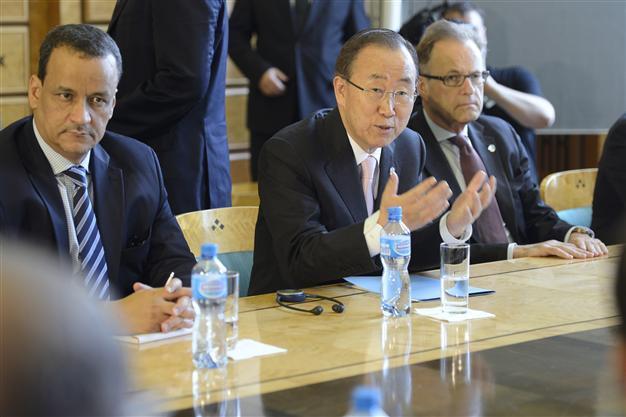Yemen rebels arrive for Geneva peace talks after 24-hour delay
GENEVA - Agence France-Presse

AP Photo
A Yemeni rebel delegation finally arrived in Geneva on June 16 for the second day of U.N.-backed peace talks after being stranded in Djibouti and accused Saudi Arabia of trying to torpedo the negotiations.
The absence of the Iran-backed rebels at the start of the high-stakes talks that were launched on June 15 by UN chief Ban Ki-moon had raised concerns.
A U.N.-chartered plane carrying the rebels had left the Yemen capital Sanaa on June 14 afternoon but was forced to wait in Djibouti for nearly 24 hours.
The rebels -- the target of air strikes since March 26 by a Saudi-led Arab coalition -- accused Egypt and Sudan of not allowing their plane to fly over their airspace.
“It was Saudi Arabia which asked its allies” to do so with the aim of “torpedoing the negotiations”, Adel Shujah, a member of the rebel team told AFP after arriving in Geneva.
He said they were able to travel on to Switzerland after the United States and Oman intervened.
Mohamed Abdel Salam, the spokesman for the Ansarullah rebel group, put up a post on Facebook thanking Oman for using “its good offices” to resolve the problem.
Oman is the only Gulf monarchy that has not joined the Saudi-led coalition fighting the rebels. Oman maintains good relations with both Iran and Saudi Arabia.
Yemen has been wracked by conflict between Iran-backed Shiite rebels and exiled President Abedrabbo Mansour Hadi’s internationally recognised government.
Global powers are keen for a speedy resolution, fearing the growing power of Al-Qaeda in the Arabian Peninsula, the Yemeni branch of the jihadist network that has taken advantage of the chaos to seize territory.
On June, Ban underscored the need for an immediate humanitarian truce in Yemen for at least two weeks to mark the holy Muslim month of Ramadan in order to furnish critical supplies to millions of people facing acute shortages.
